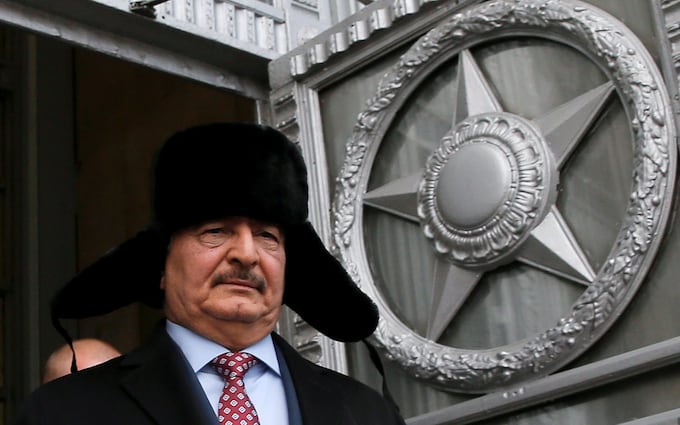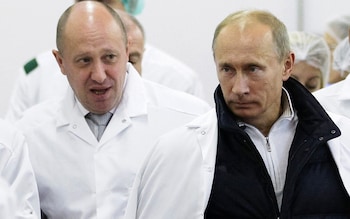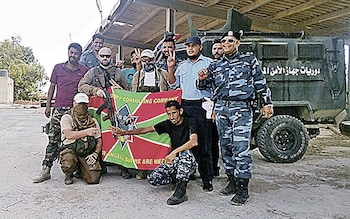
Russian mercenaries back Libyan rebel leader as Moscow seeks influence in Africa

Hundreds of mercenaries linked to Russian military intelligence have been backing the rebel commander of Libya's breakaway eastern half, The Telegraph has learned, as Moscow further expands its presence in Africa.
The murky private military company Wagner Group has been supporting Khalifa Haftar with 300 personnel in Benghazi and has supplied his Libyan National Army with artillery, tanks, drones and ammunition, a Whitehall source said.
A source close to the Libyan Russian Oil & Gas Joint Company started in Benghazi in April told The Telegraph that “lots of Wagner fighters went [to Libya], and there are rumours that military personnel also went there”.
The illegal contractors are “almost interchangeable with the GRU,” whose agents are accused of poisoning Sergei and Yulia Skripal in Salisbury, the Whitehall source said.
“They are trying to secure the deep-water ports of Tobruk and Derna for the Russian Fleet” and also “could control the flow of oil to southern Europe” if they take over Libya's energy industry, the source added.
Haftar's Libyan National Army has been seizing oilfields in a campaign that began in January. On Thursday, Haftar and the head of the internationally backed government based in Tripoli agreed in talks on the need to hold elections, although no date for the vote has been set.
The Wagner Group is linked to Yevgeny Prigozhin, a restaurant and catering magnate known as “Putin's chef” who was sanctioned by the United States after his online troll factory interfered in the 2016 election. It previously fought alongside Kremlin allies in eastern Ukraine and Syria.
Prigozhin was filmed sitting at a table with Haftar and Russia's defence minister during talks in November. Flight tracking data showed a private jet linked to Prigozhin repeatedly came on the radar heading to or from Libyan airspace, most recently in January.
Yevgeny Shabayev, a Cossack activist with ties to mercenaries who has been campaigning to legalise private military companies in Russia, claimed that he had been told by security officials that Wagner fighters were operating in Libya. He alleged that they were involved in drug and people smuggling.
Reuters reported in January that Wagner contractors were guarding Venezuela's embattled president Nicolas Maduro. Ahead of protests called for Monday, Russian air force Il-62 passenger plane flew to Venezuela on Saturday and left the next day, according to flight tracking records.
The Russian defence ministry did not respond to requests for comment. Prigozhin's Concord holding replied to questions with an email of absurdities claiming that Wagner was actually supporting Haftar from Marie Byrd Land in Antarctica.
The news of Wagner's involvement in Libya corresponds with Russia's push to increase influence in Africa through an arsenal ranging from arms and energy deals to covert military and political support.
“Putin's chef” is in charge of the darker side of this nexus, running shadowy operations that have furthered Russian commercial and political interests without any official connection to the Kremlin. His mercenaries have also been working in the war-torn Central African Republic and Sudan, two Russian military contractors told The Telegraph.
In addition, The Telegraph has uncovered evidence that Russian military contractors were in Madagascar and that Prigozhin had sent political consultants to help elect Emmerson Mnangagwa president of Zimbabwe last August.
Mr Mnangagwa dispatched envoys to Moscow in the months before and after the vote and came himself to meet Vladimir Putin in January, inking a deal to develop platinum deposits with a firm run by the son of a top Russian official.
Zimbabwe opposition politicians had claimed that Russia interfered in the election and supposedly even flew pre-marked ballots to Harare, allegations that Mr Mnangagwa denied.

But in a recording heard by The Telegraph, a geologist connected to Prigozhin said Russian political consultants had “deployed” to Zimbabwe during the election. The Telegraph independently confirmed the man was a geologist who had worked in Zimbabwe, the Central African Republic, Madagascar and several other African countries in recent years.
The geologist tied the consultants' presence to what he said were attempts by Prigozhin to get involved in mineral extraction in Zimbabwe.
He also said there was a Russian “armed presence” in Madagascar related to unrest near an oil drilling site.
It was previously reported that political consultants linked to Prigozhin were involved in last year's presidential election in Madagascar.
A Russian entrepreneur who has worked in Zimbabwe said the Moscow-based political consultancy Image Contact was involved in the Zimbabwe election.
A source close to the company said its head knew Prigozhin and had provided consultants to clients interested in resource extraction in Africa. The idea, the source said, was for the consultants help get a local politician elected, then become advisors to the leader and help their client obtain contracts.
Image Contact declined to comment, as did Russian and Zimbabwean officials involved in Mr Mnangagwa's visit to Moscow.
The foreign ministry also did not answer a question about Russian involvement in the vote, but said Russian companies were seeking natural resource projects there.
The ministry said last year 150 private and five military instructors from Russia were training army and security troops in CAR as part of a United Nations arms embargo exemption given to Moscow to support government forces.
But it is believed that Wagner mercenaries are operating on both sides of the lines after a plane with Russian military advisors and a Russian arms convoy were filmed in rebel territory.
The Prigozhin-linked geologist said Russian “military contractors are guarding our diamond or gold mines” in CAR. A company reportedly controlled by Prigozhin has been involved in Russia-CAR joint mining ventures and even funded soft-power initiatives like a radio station and beauty contest.
A January investigation tied the ambush and murder of three Russian journalists reporting on Wagner in CAR to the local president's Russian security advisor, who previously worked for companies belonging to Prigozhin. Russians have also been photographed guarding the president.
Wagner fighters are also believed to have helped dictator Omar Bashir brutally put down opposition protests in Sudan after white men in Russian-made military trucks were photographed near the demonstrations.
Moscow later admitted that Russian military instructors from both “private and state structures” were operating in Sudan.
A “Russian private military company” has been training forces in Sudan since at least December 2017, a video posted by a pro-Kremlin reporter at the time revealed.
Ruslan Leviev of the Conflict Intelligence Team, which tracks Russian military activity through open source information, said Prigozhin's mercenaries, consultants and mining companies in Africa are all instruments of Kremlin foreign policy.
“When you have both fighting forces and economic influence in a country … you can affect the internal situation,” he said. “[Prigozhin's] economic activities serve this end because his businesses in Syria and Africa are not even comparable to what he has in Russia.”
Flight records placing the Prigozhin-linked private jet in Sudan, Kenya and Chad suggest that he may be active in these places as well.
Oleg Krinitsyn, head of RSB Group, a Moscow-based security company that de-mined a cement factory in Libya in 2016, said Russian military contractors can't work in Africa without the support of the Russian authorities.

African governments are interested, he said. RSB Group has worked in countries including Madagascar, Somalia, Mozambique and South Africa and had received offers to work in Sudan.
Russian citizenship is now “like a password” to work across the continent, Krinitsyn said.
Flying into Nigeria recently, he recalled, the migration officers were hassling British travellers but welcomed him with the words “Putin, vodka, Kalashnikov good, welcome my friend”.
Mr Putin will show off his political pivot to Africa at an economic summit for African leaders in Sochi in October.
“For years we bombed our country's leadership with letters and they pushed us away,” said Irina Abramova, head of the Russian Academy of Sciences Africa Institute. “It feels like our task has been achieved and Russia has turned toward Africa.”
Additional reporting by Anastasia Mikhailova